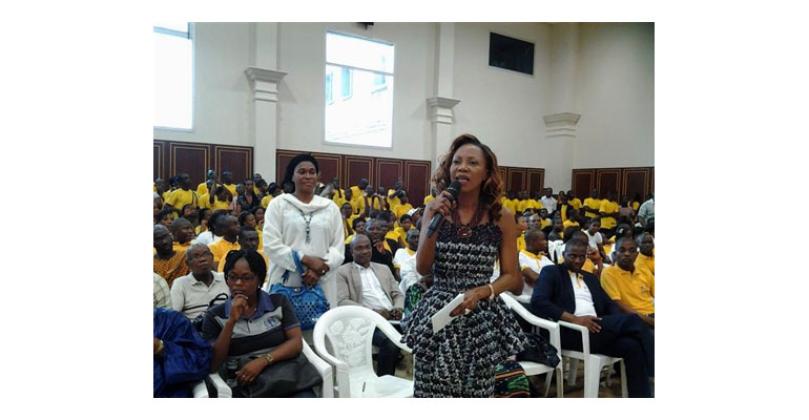
Women’s Rights Advocate
So much of the conversation in Washington and in the media on Africa tends to focus on the violent and tragic events transpiring on the continent. And while there is much work to be done by African States, their citizens and the international community to advance human rights and democracy, the work that is being done by inspiring figures all over Africa is often overlooked. Marie-Paule Kodjo, a dogged women’s rights advocate from Côte d’Ivoire, is one such figure. Her story and life’s work evidence many of the challenges women face throughout Africa, yet offers a hopeful prospect for the advancement of their rights.
The International Foundation for Electoral Systems (IFES) invited Kodjo to Washington during the 2014 U.S.-Africa Leaders Summit to take part in related events and had the opportunity to ask her about her work and the state of women’s rights in Côte d’Ivoire. Through the United States Agency for International Development-sponsored Global Women’s Leadership Fund, a program that she participated in, IFES empowered women civil society leaders to advocate for the integration of gender issues into incipient electoral systems and democratic processes. Kodjo is also a key member of the IFES-supported Ivorian Women’s Network, which was created in October 2012 as a body to address common concerns held by women in civil society. Reflecting on IFES’ work with the Women’s Network, Kodjo said she greatly appreciated the “consultative approach IFES took and credit that approach with the success achieved by the Women’s Network.” For Kodjo, international organizations are often overly prescriptive in their efforts to assist civil society. In contrast, she emphasized the inclusive nature of IFES’ efforts to assist the Women’s Network. “Everyone’s opinion, insight and effort mattered,” Kodjo averred.
When asked about the state of women’s rights in Côte d’Ivoire, Kodjo replied with one word: “lacking.” She noted that women struggle to have their voice heard in all sectors of society. For her, the number one priority for women’s rights in the country is the passing of a gender parity or quota law, as other neighboring countries have done in recent years. Gender parity laws, although frequently differing in their specific requirements, generally call for political parties to ensure that half of their slate of candidates for an election are women, with candidate lists alternating by gender, and quotas set a specific percentage of women candidates that must be met. Public financing for political parties can be tied to the stipulations of gender parity or quota laws, with parties not meeting the required threshold often being penalized by a reduction in the level of their public funding—an important provision that Kodjo said should be part of any gender parity law in her country. Gender parity laws have been implemented in Rwanda with much success, as women currently hold 64 percent of seats in the country’s Parliament. Similarly, a gender quota law in Burundi has resulted in a steady increase of female representation in its legislature over successive elections in the last decade.
“Although there has been a sustained campaign [to pass a gender parity law] in Côte d’Ivoire over the past four years, nothing has materialized,” Kodjo lamented. Indeed, there are only nine female mayors and only 26 (out of 252) female members of Parliament in Côte d’Ivoire. “It is very important to have women in decision-making positions,” Kodjo said. For her, the success of gender parity and quota laws in other African States demonstrates that such policy can result in giving women the heretofore denied or restricted right to have a say in how they are governed. Kodjo repeatedly emphasized that as Ivoirian women continue to struggle to have their voices heard, the passage of such a law is more urgently needed than ever.
In this difficult societal context, Kodjo formed Playdoo-CI in 1994 in order to support development and women’s rights at the grassroots level, with a particular emphasis on underserved rural communities. Since its founding, Playdoo-CI has set up satellite offices throughout the country. The Economic and Social Council, the United Nations’ (UN) central platform for debate and discussion on sustainable development, officially recognized Playdoo-CI in 2010. Just a year prior, Kodjo was chosen as the first President of the nascent Women’s Coordination Group for the Post-Reconstruction Crisis (COEFEMCI), a network of over 300 civil society organizations that provides a platform for women to advocate for their rights at the national level with a particular focus on governance, elections and post-conflict reconstruction. While Kodjo has dedicated her life to fighting for women’s rights, she has a unique and diverse background. Indeed, Kodjo is a bit of a renaissance woman. An abdominal surgeon by training, she also studied law and human rights. Despite her full portfolio of work with Playdoo-CI and COEFEMCI, she still performs surgeries. Notably, she does so for needy patients at no charge.









